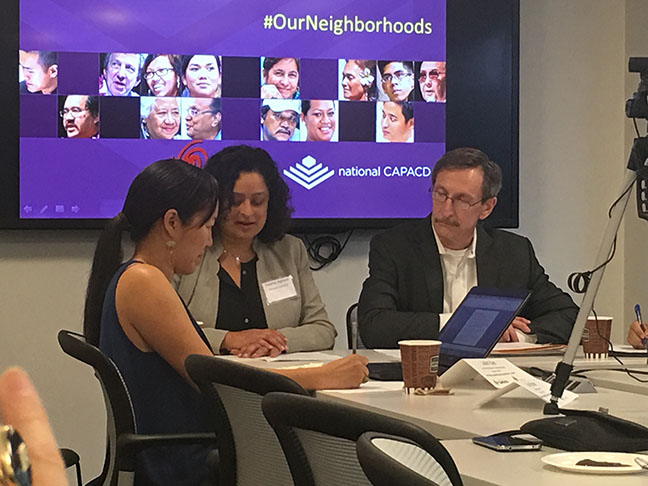WASHINGTON — Asian American and Pacific Islanders are the latest minority groups to be displaced because of gentrification, disrupting their communities and often forcing them into overcrowded housing, according to a report issued Wednesday by two major advocacy groups.
Tony Romano, director of organizing for Right to the City, said at a news conference Wednesday if the displacement from gentrification continues, it will be difficult to find historic communities of color. Rising rents and land values caused by revitalizing urban centers has made it increasingly difficult for Asian American and Pacific Islanders to stay in their homes, he said.
“If there’s new development that brings a grocery store to the food desert, the irony is the grocery store will come but all the residents who needed that grocery store who have been there for decades are gone,” said Romano. “The problem is if there are any improvements or benefits, the long-time residents don’t benefit from it. It’s new people, typically white higher income people that come in and benefit from the development.”
Washington, Boston, Manhattan and Seattle all have Chinatowns where residents are facing significant displacement, the report said. D.C.’s Chinatown is an example of a once thriving neighborhood that is down to two blocks. Boston’s Chinatown is shrinking and Manhattan’s Chinatown residents have been forced to other boroughs, said Lailan Huen, organizing manager for the National Coalition for Asian Pacific American Development.
Robin Danner, policy chair for the Council for Native Hawaiian Advancement, said Congress should draft legislation to protect Native Hawaiian and Pacific Islander communities against displacement so they can preserve their unique history.
The report said several of the communities have adopted strategies that appear to help the communities stay together despite gentrification. Among the successful strategies are:
- Historic Preservation – The Seattle Chinatown International District Preservation and Development Authority works with property owners throughout the Chinatown International District to support the maintenance of community ownership.
- Homelessness Diversion – The Interim Community Development Association in the International District and Little Saigon in Seattle has partnered with multiple service agencies to help homeless residents including Pacific Islanders, African Americans and Ethiopian refugees access resources to attain emergency housing.
- Citywide Anti-Displacement Plan- The Asian Pacific American Network of Oregon in the Jade District in Portland, Oregon along with 21 other groups organized 11 land use strategies that would fight displacement and expand access to affordable housing for the next 20 years.
Poverty among Asian Americans and Pacific Islanders increased 50 percent from 2007 to 2014 compared with 20 percent for Americans overall.
In Hawaii, the Asian American and Pacific Islander community is being forced to move to the continental United States, Huen said.
Lahela Williams, Hawaii Community Assets program director, said the state has a large AAPI homeless population.
“We’ve seen everything from families fundraising to pay rent to fundraising to buy tickets to move with family” to the continental U.S., she said. “The millennials are apt to leave the state and not come back home for opportunities. I’ve had tons of classmates move to Vegas. I’ve had tons of classmates move to California. They’re looking for opportunities we don’t have. ”
Romano says the groups want federal policies that ensure development without displacement, including rent control, just-cause eviction and agreements with particular landlords. It would also include demands for community-controlled land. The community would be able to create land trusts where the community owns the land collectively then whoever owns the structure has to abide by the rules of the collective and can have limitations on evictions and raising rent.

